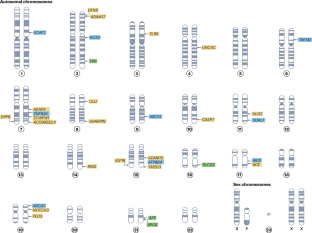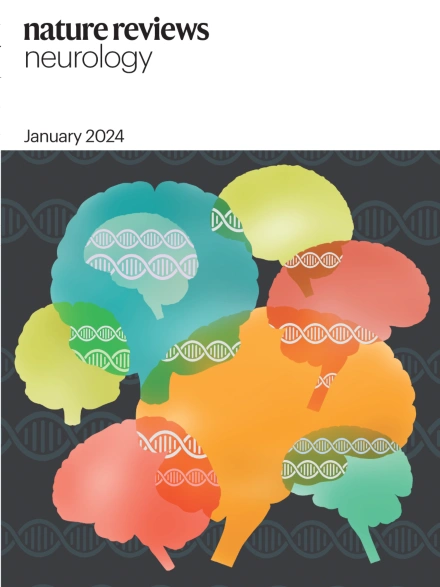The impact of rare genetic variants on Alzheimer disease
IF 28.2
1区 医学
Q1 CLINICAL NEUROLOGY
引用次数: 0
Abstract
Alzheimer disease (AD) is a progressive neurodegenerative disease with a strong genetic component. Although autosomal dominant mutations and common risk variants in AD risk have been extensively studied, the genetic underpinning of polygenic AD remains incompletely understood. Rare variants could elucidate part of the missing heritability in AD. Rare variant research gained momentum with the discovery of a rare variant in TREM2, along with loss-of-function variants in ABCA7 and SORL1, and has come into full bloom in recent years. Not only has the number of rare variant discoveries increased through large-scale whole-exome and genome sequencing studies, improved imputation in genome-wide association studies and increased focus on understudied populations, the number of studies mapping the functional effects of several of these rare variants has also significantly increased, leading to insights in the pathogenesis of AD and drug development. Here we provide a comprehensive overview of the known and novel rare variants implicated in AD risk, highlighting how they shine new light on AD pathophysiology and provide new inroads for drug development. We will review their impact on individual, familial and population levels, and discuss the potential and challenges of rare variants in genetic risk prediction. In this Review, the authors summarize the genetic and epidemiological characteristics of rare variants associated with Alzheimer disease so far, and explore the insights that these variants have provided into the pathogenic mechanisms of the disease.


罕见基因变异对阿尔茨海默病的影响
阿尔茨海默病(AD)是一种具有强烈遗传成分的进行性神经退行性疾病。虽然常染色体显性突变和阿尔茨海默病的常见风险变异已被广泛研究,但多基因阿尔茨海默病的遗传基础仍不完全清楚。罕见的变异可以解释部分阿尔茨海默病缺失的遗传性。随着TREM2中罕见变异的发现,以及ABCA7和SORL1中功能缺失变异的发现,罕见变异研究获得了发展势头,近年来进入了全面发展阶段。通过大规模全外显子组和基因组测序研究,罕见变异的发现数量增加,全基因组关联研究的改进,以及对未充分研究人群的关注增加,绘制这些罕见变异的功能影响的研究数量也显著增加,从而对阿尔茨海默病的发病机制和药物开发有了深入的了解。在这里,我们全面概述了与阿尔茨海默病风险相关的已知和新的罕见变异,重点介绍了它们如何为阿尔茨海默病病理生理学提供新的亮点,并为药物开发提供新的进展。我们将回顾它们对个体、家族和群体水平的影响,并讨论罕见变异在遗传风险预测中的潜力和挑战。
本文章由计算机程序翻译,如有差异,请以英文原文为准。
求助全文
约1分钟内获得全文
求助全文
来源期刊

Nature Reviews Neurology
医学-临床神经学
CiteScore
29.90
自引率
0.80%
发文量
138
审稿时长
6-12 weeks
期刊介绍:
Nature Reviews Neurology aims to be the premier source of reviews and commentaries for the scientific and clinical communities we serve. We want to provide an unparalleled service to authors, referees, and readers, and we work hard to maximize the usefulness and impact of each article. The journal publishes Research Highlights, Comments, News & Views, Reviews, Consensus Statements, and Perspectives relevant to researchers and clinicians working in the field of neurology. Our broad scope ensures that the work we publish reaches the widest possible audience. Our articles are authoritative, accessible, and enhanced with clearly understandable figures, tables, and other display items. This page gives more detail about the aims and scope of the journal.
 求助内容:
求助内容: 应助结果提醒方式:
应助结果提醒方式:


